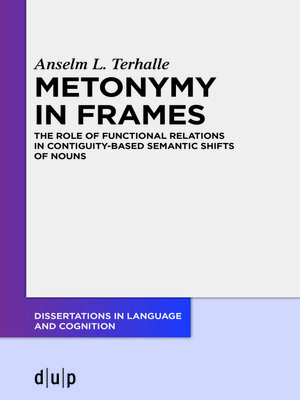Metonymy in Frames
ebook ∣ The Role of Functional Relations in Contiguity-Based Semantic Shifts of Nouns · Dissertations in Language and Cognition
By Anselm L. Terhalle

Sign up to save your library
With an OverDrive account, you can save your favorite libraries for at-a-glance information about availability. Find out more about OverDrive accounts.
Find this title in Libby, the library reading app by OverDrive.



Search for a digital library with this title
Title found at these libraries:
| Library Name | Distance |
|---|---|
| Loading... |
This work refines the notion of metonymy and the underlying notion of conceptual contiguity by describing a fundamental structural property of metonymy.
Studied since antiquity, metonymy is a ubiquitous mechanism of meaning construction in context that involves a linguistically coded source concept that directs attention to a situationally relevant target concept. Modelling metonymic contiguity by means of recursive attribute-value structures, inspired by findings from cognitive psychology, suggests that the metonymic relation depends largely on the functionality of the source with respect to the target.
Based on this structural property, several patterns can be identified as potential bases for metonymic shifts. How these shifts are coded on the linguistic surface varies depending on whether the focus within the relevant frame is more on the source (metonymy closer to literal use) or more on the target (metonymy closer to word formation). Furthermore, decomposing the contiguity relation into functional relations hints at a potential conceptual distance between the source and target. This approach contributes to understanding the boundaries and possibilities of metonymy.







